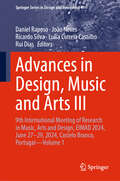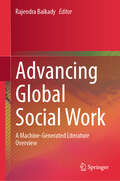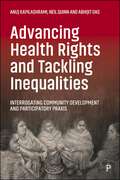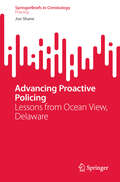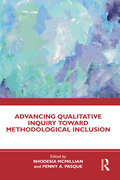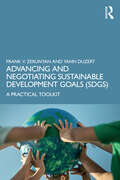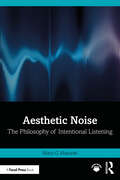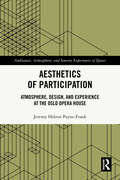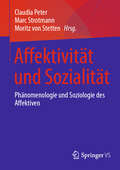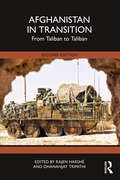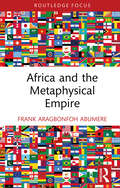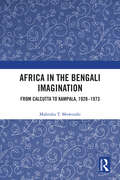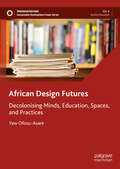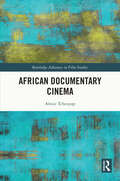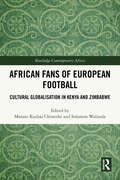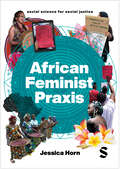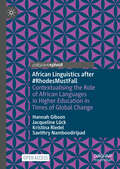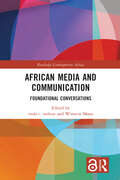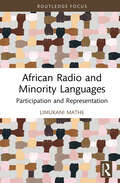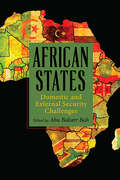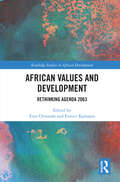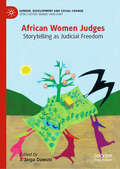- Table View
- List View
Advances in Design, Music and Arts III: 9th International Meeting of Research in Music, Arts and Design, EIMAD 2024, June 27–29, 2024, Castelo Branco, Portugal—Volume 1 (Springer Series in Design and Innovation #49)
by Daniel Raposo João Neves Luísa Correia Castilho Rui Dias Ricardo SilvaThis book presents cutting-edge methods and findings that are expected to contribute to significant advances in the areas of communication design, fashion design, interior design and product design, as well as musicology and other related areas. It especially focuses on the role of digital technologies, and on strategies fostering creativity, collaboration, education, as well as sustainability and accessibility in the broadly-intended field of design. Gathering the first volume of the proceedings of the 9th EIMAD conference, held in hybrid format on June 27–29, 2023, and organized by the School of Applied Arts of the Instituto Politécnico de Castelo Branco, in Portugal, this book offers a timely guide and a source of inspiration for designers of all kinds, advertisers, artists, and entrepreneurs, as well as educators and communication managers.
Advances in Forensic Biology and DNA Typing
by Anna Barbaro Amarnath MishraAdvances in Forensic Biology and DNA Typing examines a broad range of forensic DNA applications and topics, based on internationally recognized best practices. As a contributed volume that includes chapters by experts from around the world, the book covers a broad range of forensic DNA applications and topics. This includes current methods for DNA extraction and typing as well as other technologies and emergent techniques in the field such as Trace and Touch DNA, Forensic DNA Phenotyping (FDP), Forensic Investigative Genetic Genealogy (FIGG), Rapid DNA Biological Fluid Identification by epigenetics, and Pharmacogenomics. The book also explores the development and usage of forensic biology for the analysis of non- human samples and the relevance of DNA databases, management systems and quality certification in forensic.Key features:• Highlights sources of DNA (including biological fluids, hair, bones, teeth) detailing how to address the challenges of various sample types, quantities, and environmental factors• Presents best practices in investigative and collection procedures, as well as evaluative and testing methods, of biological samples• Addresses both human and non- human DNA analyses and applications for both criminal and wildlife investigationsAdvances in Forensic Biology and DNA Typing is a highly illustrated guide that will serve as a useful reference for forensic laboratory professionals, investigators, and students, as well as legal professionals.
Advancing Global Social Work: A Machine-Generated Literature Overview
by Rajendra BaikadyThis book provides a machine-generated overview of social work across the globe, providing an in-depth understanding on social work education, practice and research. It shows the latest developments in social work, curriculum, pedagogy, practice, research and clinical social work. Each chapter is organized by the book editor with a human-written introduction. In a time when the world is facing several challenges and social work as a human service profession is getting global recognition and acceptance, it is essential to generate evidence-based literature on the development, changes, and challenges. Chapters in this book help readers understand contemporary debates, discussions and insights on global social work and its growth and development. It is a one-stop resource for scholars studying social work, social policy, social welfare, social exclusion and inclusion, sociology and other social science discipline, as it presents the literature on the recent development of the field in one place. The book is equally valuable to undergraduate and postgraduate social work students across all educational institutions without boundaries. The auto-summaries have been generated by a recursive clustering algorithm via the Dimensions Auto-summarizer by Digital Science. The editor of this book selected which Springer Nature content should be auto-summarized and decided its order of appearance. Please be aware that these are extractive auto-summaries, which consist of original sentences, but are not representative of its original paper, since we do not show the full length of the publication. Please note that only published SN content is represented here, and that machine-generated books are still at an experimental stage.
Advancing Health Rights and Tackling Inequalities: Interrogating Community Development and Participatory Praxis
by Abhijit Das Anuj Kapilashrami Neil QuinnIn a world facing multiple intersecting crises, the push for healthier, more resilient societies has never been more urgent. This timely book reveals how empowered and organised communities can lead this change. It offers policy makers, academics, and activists research-driven insights, decolonial perspectives and real-world examples of organising and collective actions from across the global North and South. By centring on the power of community development, participation, and social movements, the book delivers actionable frameworks to tackle inequality and advance the right to health, making it an essential resource for anyone committed to health justice and for building equitable and sustainable health systems worldwide.
Advancing Proactive Policing: Lessons from Ocean View, Delaware (SpringerBriefs in Criminology)
by Jon ShaneThis brief documents a demonstration project undertaken in Ocean View, Delaware on a novel, scalable tool for police agencies seeking to optimize their patrol operations while providing transparency and accountability in resource management. It describes and explains the broader set of circumstances, conditions, and factors that surrounded and influenced the Ocean View Police Department&’s goal to expand the agency toward proactive policing. This work encompasses the social, economic, political, and technical aspects that affected the design, implementation, and outcome. The central research question was: If the Ocean View Police Department increases proactive time from 67% to 75%, then how many officers do we need, and what are the projected costs? The study offers a roadmap for agencies looking to expand their proactive policing efforts, and understand the cost drivers associated with the patrol function. The book details the demands that police agencies face and the complexities of their work. The chapters that follow acknowledge the managerial and fiscal difficulties related to staffing and funding the police, while simultaneously offering suggestions for increased community collaboration. The universal model presented here can be used by all police executives, elected and appointed city officials, academics, finance and directors, analysts.
Advancing Qualitative Inquiry Toward Methodological Inclusion
by Rhodesia McMillianThis fascinating book provides a groundbreaking resource for innovative approaches to qualitative inquiry that address equity and justice and equip readers with tools to enact these approaches in their own work.Comprising contributions from award-winning qualitative scholars, chapters show how methodologies can be employed to address social issues and problems from the social-political milieu including education, COVID-19, racial inequalities, health inequalities, climate change, and debates around gender diversity amongst others. This book offers the new and innovative paradigms, methodologies, and methods a cutting-edge group of scholars has crafted as well as the ‘how to’ so readers may employ these approaches in dissertations, grants, and various research team scholarship. Contributors reimagine the next generation of “rigorous” qualitative methodologies by pushing on the boundaries of existing methodological approaches as well as presenting new ways of engaging in research that prioritise innovation, equity and justice.This unique edited volume is aimed at students and researchers studying or using qualitative methodologies and inquiry who wish to be exposed to emergent conceptualizations and innovations regarding qualitative research methodology and its congruent methods.
Advancing and Negotiating Sustainable Development Goals (SDGs): A Practical Toolkit
by Frank V. Zerunyan Yann DuzertAdvancing and Negotiating Sustainable Development Goals (SDGs) presents a negotiation framework based on the principles of network/collaborative governance in implementing UN Sustainable Development Goals (SDGs). Trialed in the classroom and workplace, the practical toolkit gives you the tools necessary for facilitating future collaboration and knowledge transfer to all those working to strengthen the formulation, implementation, and achievement of SDG-oriented policies. Advancing and Negotiating Sustainable Development Goals (SDGs) is essential reading for those interested in a better and more sustainable future for all.
Aesthetic Noise: The Philosophy of Intentional Listening
by Mary G. MazurekAesthetic Noise: The Philosophy of Intentional Listening considers the complex nature of noise within the framework of philosophical filtering, examining how, if noise is engaged with aesthetically, it can produce profound experiences and understandings.Applying the philosophies of Edmund Burke, Martin Heidegger, Jacque Derrida, and Julia Kristeva to works by Luigi Russolo, John Cage, Steve Reich, Alison Knowles, Annea Lockwood, Alyce Santoro, and Sunn O))), this book explores noise as an art material, and ultimately how it can become a tool for activism and expanded creative possibilities. It demonstrates that, by engaging multiple philosophies in concert, the value of aesthetic noise is amplified, thus allowing the listener to better appreciate noise and its possibilities.Providing greater insights into noise as an aesthetic material, Aesthetic Noise will be of interest to researchers and students of sound studies, philosophy, and sound art, as well as sound designers, artists, musicians, and composers.
Aesthetics of Participation: Atmosphere, Design, and Experience at the Oslo Opera House (Ambiances, Atmospheres and Sensory Experiences of Spaces)
by Jeremy Hektor Payne-FrankThis book explores the way people participate with the Oslo Opera House, Norway. As an iconic and culture-led building, these different modes of participation reveal the tensions between staged space and individual experience.Movement, materiality, light, and art are viewed through an atmospheric lens to demonstrate how architecture can shape people’s engagement with, and understanding of, urban space. This book contributes to a growing literatureon atmosphere in relation to our experience of the built environment. In adopting this atmospheric perspective, the book speaks to the concerns of designers, users, and researchers interested in the way contemporary development infuses our cities with the experiential, as a means of developing access, participation, and democracy. It explores the ways in which people experience a building, held up against the claims, intentions, and assumptions that surround it. The book’s focus on design, participation, and experience, in relation to political ideals, will appeal to architects, planners, and academics concerned with the production of space. Equally, its underlying atmospheric contribution and methodological approach will be of interest to designers, scholars, professionals, and students of ambiance, affect and atmosphere, architecture, city planners and urban developers, human geographies, anthropology, and urban studies.
Affektivität und Sozialität: Phänomenologie und Soziologie des Affektiven
by Claudia Peter Marc Strotmann Moritz Von StettenAffekte bestimmen unser soziales Zusammenleben. In Form von Empfindungen, Stimmungen und Sensibilitäten sind sie Ausdruck unserer Berührbarkeit und Empfänglichkeit, sie schärfen unsere Aufmerksamkeit, lenken unsere Wahrnehmung oder treffen uns in unserer Verletzlichkeit. Über sie und mit ihnen erschließen wir uns selbst, andere und die Welt. Die affektiven Dimensionen des Sozialen sind infolge des affective turn Gegenstand neuerer interdisziplinärer Forschung. Anliegen des Buches ist es, das Potential der Phänomenologie innerhalb der Affektforschung anhand theoretischer und empirischer Fallstudien aufzuzeigen. Der Band versammelt Beiträge aus der Philosophie und Soziologie, die unter anderem an phänomenologische Ansätze von Husserl, Scheler, Merleau-Ponty, Patočka, Levinas, Waldenfels, Schmitz und Ratcliffe anknüpfen. Damit ermutigen die Texte des Bandes zu einem verstärkten Dialog zwischen philosophischer Reflexion und empirischer Sozialforschung.
Affordable Housing in the United States
by Gregg Colburn Rebecca J WalterAffordable Housing in the United States addresses the issue of affordability of housing, or the lack thereof, going beyond conventional policy discussions to consider fundamental questions such as: What makes housing affordable and for whom is it affordable? What are the consequences of a lack of affordable housing? How is affordable housing created? And what steps can be taken to ensure all people have access to affordable housing?With the understanding that different households face different challenges, the book begins by breaking down the variables relevant to the study of affordable housing, including housing costs, household income, geographic location, and market forces, to help readers understand and quantify affordability at the individual and societal level. Part II examines the consequences of unaffordable housing, highlighting racial inequities in housing access and affordability, and multiple forms of housing precarity including eviction and homelessness. Part III explores the entities involved in providing affordable housing such as local and federal governments, regulatory agencies, non-profit organizations, and for-profit developers. In Part IV, case studies from US cities demonstrate the complex web of organizations, policies, and market conditions that influence housing affordability, revealing substantial regional variations in access and policy response. Part V proposes a future roadmap and outlines four potential states with radically different outcomes for the affordable housing system in the United States.An ideal book for graduate and undergraduate courses in economics, public policy, real estate finance and development, sociology, and urban planning, this title will also be of value to professionals and policymakers seeking to understand and improve housing affordability and access.
Afghanistan in Transition: From Taliban to Taliban
by Rajen Harshé Dhananjay TripathiOwing to its geo-strategic location and mineral wealth, Afghanistan has acquired significance in the inter-state politics of Asia as well as world politics during the past decades. This book discusses the Taliban’s return which outlines the recent and current developments in contemporary Afghanistan. The essays in this volume: Locate Afghanistan under globalisation and reflect on the state and nation-building efforts in Afghanistan by shedding light on the status of citizens, especially women Analyse how the Taliban survived in all these years, and how it returned to power Examine Afghanistan’s relations with major powers like the USA, China, and India and explore the intricacies of ties between India, Pakistan, and Afghanistan within the Indian subcontinent Shedding light on a threshold moment in 21st Century world politics, this work will be useful to scholars and researchers in political science, international relations, sociology, area studies, and the interested general reader.
Africa and the Metaphysical Empire (Routledge Studies in African Philosophy)
by Frank Aragbonfoh AbumereThis book investigates whether African cultures can appropriate some useful aspects of Western cultures, or whether doing so risks falling into the metaphysical empire and diluting African identity.Ngugi wa Thiong’o and Ndlovu-Gatsheni characterise the metaphysical empire as an intangible non-physical and non-geographical invasion of the mental universe of formerly colonised peoples. As mutual exclusivists, they argue that authentic decolonization necessitates a complete dissociation of the African and her culture from colonial heritage. However, cultural appropriationists such as Wole Soyinka, Chinua Achebe and Chimamanda Ngozi Adichie argue that the African adoption of colonial heritage such as the English language is in no way antithetical to decolonization. This book delves into the debate by exploring the strengths and weaknesses of cultural appropriationism and, on the other hand, testing the validity of mutual exclusivism. The book demonstrates that cultural appropriation without falling into the metaphysical empire is possible, but that this poses important questions about the nature of the decolonization project itself, and where it should start and stop. A more accommodative decolonization would recognize the relationship between cultural universals and particulars, whilst also creating room for cultural appropriation. Ultimately, the book argues that both cultural appropriationists and mutual exclusivists must simultaneously renounce absolutism. By being amenable to a fusion of horizons, discourse can move beyond the decolonization fallacy of arguing that things are always either/or.This original and important contribution to the metaphysical empire debate will be a seminal read for researchers across the fields of philosophy, political science, African studies, and Black studies.
Africa in the Bengali Imagination: From Calcutta to Kampala, 1928-1973
by Mahruba T. MowtushiThis book examines textual representations of Africa in the Indian imagination from 1928 to 1973. It critically analyses Bengali literature during this period, their imitation of colonial racial prejudices and how it allowed Bengalis to fashion their identity. It analyses the development of ‘Africa’ as an idea and historical reality through the writings of five Bengali writers including the Bengali novelist Bibhutibhushan Bandyopadhyay, the children’s author Hemendra Kumar Roy, the poet and philosopher Rabindranath Tagore, the playwright Ganesh Bagchi and the surrealist poet and founding editor of Transition magazine Rajat Neogy. The book shows how these writers engage with the idea of Africa and their influence in the construction of the Bengali cultural identity during the freedom struggle, the Partition of Bengal in 1947 and the creation of Bangladesh in 1971. The book offers readers a glimpse of the exotic imaginary locales of Africa while offering an in-depth look into the interconnected histories, cartographic routes and cultural exchange between India and Africa. A first of its kind, this book will be an excellent read for students and scholars of literature, comparative literature, history, cultural studies, postcolonial studies, South Asian studies, African studies and diaspora studies. .
African Design Futures: Decolonising Minds, Education, Spaces, and Practices (Sustainable Development Goals Series)
by Yaw Ofosu-AsareThis book responds to the question "Is it time to reimagine design education in Africa and decolonise our creative future?" The proposed volume is designed to provide a source of inspiration to readers in imagining their own futures within fields of Creative industries such as performative art, architecture design, industrial design, media production, drawing and illustration, filmmaking, design, documentary, virtual reality, and others. With a focus on decolonising design education in Africa, this book will challenge the dominant capitalist narrative and centre on the needs of African communities. It will provide insights into the challenges and opportunities of decolonising design education and propose alternative models for design education that promote social and environmental sustainability, cultural preservation, and community empowerment. Collectively, the proposed book's accounts bring to life the career possibilities within a rapidly expanding global sector of creativity and innovation with immense cultural, social, political, and economic impact. By exploring new models of creative practice and education that centre on social impact, cultural relevance, and community empowerment, this book will inspire readers to think critically about their own futures in the Creative Industries in Africa.
African Documentary Cinema: Beyond Representation (Routledge Advances in Film Studies)
by Alexie TcheuyapAfrican Documentary Cinema investigates the inception and trajectory of contemporary documentary filmmaking in sub-Saharan African countries and their diasporas. The book challenges critical paradigms that have long prevailed in African film criticism, shedding light on the diverse discourses and evolving aesthetic trends present within documentary films.Situating his analysis within the context of the significant transformation of the African film industry, the author focuses on the development, diversity, and shifting dynamics that have impacted contemporary documentary cinema. Examining the historical, political, sociological, economic, and cultural factors that have facilitated the rise of documentary films—especially those created by female documentarians—the book assesses the emergence of documentary filmmakers spanning different generations. Their training, practices, and innovative perspectives on social, political, and environmental issues ultimately give rise to new frameworks for understanding the bio-documentary genre, issues of gender discrimination, LGBTQIA+ identities, environmental trauma, genocide, and memory on the African continent.This ground-breaking study offers new insight into a rapidly expanding topic and will appeal to students and scholars in the fields of film studies, documentary film, media industry studies, African studies, French, postcolonial studies, politics, and cultural studies.
African Fans of European Football: Cultural Globalisation in Kenya and Zimbabwe (Routledge Contemporary Africa)
by Manase Kudzai Chiweshe Solomon WaliaulaThis book examines the increasing influence of European football in African societies, considering the processes and significance of being a fan and what this means for the wider globalisation of popular culture.Focussing on fan cultures in Kenya and Zimbabwe, the book argues that instead of manifestations of neo-colonialism, African fandoms of European football are practised in ways that resonate with and help reconstruct and perform the socio-cultural substance of the African communities in question. European football is therefore instrumentalised to help define the identities of the members of the fandom communities and articulate their experience of their reality in their immediate circumstances.This book reflects how the global and local can coalesce in cultural trends such as football fandom. It will interest sports, leisure, popular culture, and social anthropology researchers in Africa and beyond.
African Feminist Praxis: Cartographies of Liberatory Worldmaking (Social Science for Social Justice)
by Jessica Horn"Written in love and fire, African Feminist Praxis is meticulous and visionary." - Dr. Pumla Dineo Gqola, SARChI Chair in African Feminist Imagination, Nelson Mandela University and author of Female Fear Factory So much of the story of African resistance has been told in the masculine, tracing the history of spectacle: great struggles, great speeches, the grand displays of nation building. This book adds to the literature that reverses this, exploring the flesh and breadth of contemporary African feminist politics as articulated across the African continent. It is structured around the key principles of kinship, courage, pleasure, care and memory, and draws on the African feminist academic canon, the "grey literature" of practitioner knowledge and narratives of feminists activists themselves. Through this it evidences the argument that African feminist praxis is fundamentally a politics of proposition, a mode of liberatory worldmaking. The Social Science for Social Justice series challenges the Ivory Tower of academia, providing a platform for academics, journalists, and activists of color to respond to pressing social issues.
African Feminist Praxis: Cartographies of Liberatory Worldmaking (Social Science for Social Justice)
by Jessica Horn"Written in love and fire, African Feminist Praxis is meticulous and visionary." - Dr. Pumla Dineo Gqola, SARChI Chair in African Feminist Imagination, Nelson Mandela University and author of Female Fear Factory So much of the story of African resistance has been told in the masculine, tracing the history of spectacle: great struggles, great speeches, the grand displays of nation building. This book adds to the literature that reverses this, exploring the flesh and breadth of contemporary African feminist politics as articulated across the African continent. It is structured around the key principles of kinship, courage, pleasure, care and memory, and draws on the African feminist academic canon, the "grey literature" of practitioner knowledge and narratives of feminists activists themselves. Through this it evidences the argument that African feminist praxis is fundamentally a politics of proposition, a mode of liberatory worldmaking. The Social Science for Social Justice series challenges the Ivory Tower of academia, providing a platform for academics, journalists, and activists of color to respond to pressing social issues.
African Linguistics after #RhodesMustFall: Contextualising the Role of African Languages in Higher Education in Times of Global Change
by Hannah Gibson Jacqueline Lück Kristina Riedel Savithry NamboodiripadThis open access book explores the link between African languages, decolonisation and transformation. It has its origins in a survey of students and instructors at higher education institutions both inside and outside Africa, and takes as a starting point the 2015 student-led #RhodesMustFall movement which spread across universities in South Africa. Many of the questions being asked by #RhodesMustFall found parallels in ongoing discussions across in Europe and North America. This book presents findings from the survey, set against the broader backdrop of calls for decolonisation and transformation, drawing specifically on linguistics teaching, scholarship and research. The findings provide new insights into how African languages and linguistics are framed and engaged with, amidst decolonial struggles in higher education. This book will be relevant to readers with an interest in African languages, social justice, higher education, and decolonisation.
African Media and Communication: Foundational Conversations (Routledge Contemporary Africa)
by Winston Mano Viola C. MiltonThis book provides an important set of critical reflections from a selection of foundational scholars of African media and communication studies through biographical method. The book interrogates the center of mainstream academic scholarship by providing the foundational history and origins of an Africanist conceptual model while highlighting its significance globally.The editors use biographical and life story interviews to critically review the respondents’ interpretations of their key works and arguments in relation to key moments in the field, the continent and globally. Though the book is focussed on recovering pioneering arguments by key thinkers in African media and communication, efforts of individual academics are to be understood in the context of their work with others and within institutions that are networked, locally and globally. By bringing together many of the leading figures of African communication and media studies in a single volume, this book provides a critical corrective to the dearth of knowledge and information about who the key thinkers are and what their key arguments, theories and models for media and communication in African contexts entail.As such, it will be of interest to scholars of media and communications in Africa, and the global south.
African Radio and Minority Languages: Participation and Representation (Routledge African Media, Culture and Communication Studies)
by Limukani MatheWithin Africa, radio provides an important platform for accommodating diverse linguistic groups and enabling speakers to express themselves in their own local languages. This book investigates how radio broadcasting across the continent provides a platform for cultural participation and the representation of minority language speakers in a contested public sphere. In African media, a fierce contest wages for representation and participation, in which majority languages often emerge at the exclusion of minority ethnolinguistic groups. This book considers the important role that radio can play in broadcasting in minority languages. Drawing on in-depth original analysis, ethnographic observation and interviews with minority language radio hosts and guests from across South Africa, Zimbabwe, Nigeria, Malawi, Namibia, Mozambique, Lesotho and Kenya, this book considers to what extent African radio is accommodative of minority languages and what the challenges and prospects are for this. Ultimately, the book argues that radio’s three-tier system of broadcasting through analogue and digital radio leaves the medium of radio particularly well placed to provide equal access for ethnolinguistic groups in Africa.This ambitious and broad-ranging study will be an essential read for scholars and students of media studies and sociolinguistics in Africa.
African States: Domestic and External Security Challenges (SUNY series, James N. Rosenau series in Global Politics)
by Abu Bakarr BahEssays on the security challenges faced by African states.The central concern that shapes this edited volume is the nature of the African state. Contributors point to an interesting intersection of domestic and external issues that is framed as a glocalized security situation. Individual chapters shed new insights on conflict drivers through case studies on Sierra Leone, Cameroon, Mali, Nigeria, and Somalia, as well as broader issues on the nature of African states. Arguments pivot on three issues, which show the intersection of the domestic and external forces that render the African state as a glocal problem: (a) the colonial roots of the state, (b) problems of governance, and (c) international and regional security imperatives. By problematizing the African state and connecting the security challenges of African states to colonialism, patrimonial rule, and geopolitical security issues, African States brings forth a new way of examining African states through the notion of glocalized security.
African Values and Development: Rethinking Agenda 2063 (Routledge Studies in African Development)
by Ezra Chitando Eunice KamaaraThis book considers the importance of African values, not only in catalysing development, but in sustaining it. Arguing for an urgent need for rapprochement between African politicians and intellectuals, the book discusses how African values and identities can contribute to the successful realization of initiatives such as the African Union’s Agenda 2063 and the United Nation’s Sustainable Development Goals (SDGs). Over the course of the book, the authors consider key themes such as identity, indigenous and modern worldviews; personhood; individual and communal perspectives; peace and conflict; and well-being. The book explores the role of religion and moral values, as well as African worldviews such as Ubuntu. Overall, the book demonstrates that African values will be central to galvanising Africa’s post-colonial transformation. This book will be an important read for policymakers and for researchers working on African development, politics, sociology, religion and philosophy.
African Women Judges: Storytelling as Judicial Freedom (Gender, Development and Social Change)
by J. Jarpa DawuniThis edited volume centers the voices of African women judges as agents of justice and equality. The legal and personal narratives approach in the book privileges the contributors’ lived experiences, professional trajectories, contributions and challenges. The legal narrative storytelling approach also contributes to oral histories of African indigenous knowledge production and transfer. By highlighting the substantive representation of women in African judicial leadership, the chapters examine their impact on the development of jurisprudence, judicial administration, and contributions to the rule of law, access to justice, and women's rights in contemporary Africa. This book significantly contributes to the diversity of knowledge and representation in the global discourse on gender and judging, offering a novel contribution to the growing literature on African women judges.
